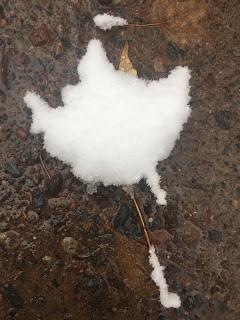I admit the result of the storm was beautiful, though. It had been a gorgeous fall in full color. Many trees were still holding on to some of that, so the mixture of the pristine white with all the reds, golds, oranges and forest greens made one’s heart sing. But very warm days leading up to that pre-winter weather event left a lot of warmth in the ground, especially the gravel roads; so though the woods and yards were a thick snowy blanket, the road was wet but relatively clear.
About halfway through the snowfall I went out for a walk on that road and discovered dozens of these magnificent little snow sculptures where leaves had fallen. You may identify the maples easily. How did you do with the birch and large tooth aspen? In all my comings and goings over the years, I did not recall seeing anything like it before. The conditions must have been just perfect for it, and it reminded me how often a naturalist sees things they’ve never seen before nor ever may again. I love that part of being a nature observer, but it always takes me a little by surprise. (Continued below photos.)
The Northumbria Community of the U.K. has a lovely blessing that is part of the morning liturgy in their book Celtic Daily Prayer, a prayer blessing I have loved for years and offered over many. It goes like this:
May the peace of the Lord Christ go with you wherever he may send you.
May he guide you through the wilderness, protect you through the storm.
May he bring you home rejoicing at the wonders he has shown you.
May he bring you home rejoicing once again into our (or his) doors.
The wonders God has shown me… I see them every day, large and small. I hope you do as well. They’re out there. I am grateful.
Gitcha some outdoors.
~~ RGM, November 7 2022
















